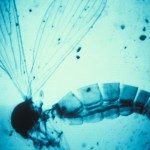Lien vers Pubmed [PMID] – 31513769
Lien DOI – S1931-3128(19)30370-110.1016/j.chom.2019.08.005
Cell Host Microbe 2019 09; 26(3): 309-313
The inexorable emergence of mosquito-borne arboviruses and the failure of traditional vector control methods to prevent their transmission have triggered the development of alternative entomological interventions to render mosquito populations incapable of carrying arboviruses. Here, we use a theoretical framework to argue that decreasing mosquito tolerance to arbovirus infection could be a more evolutionarily sustainable disease control strategy than increasing mosquito resistance. Increasing resistance is predicted to select for mutant arboviruses escaping resistance, whereas reducing tolerance should lead to the death of infected vectors and thus select for mosquito-attenuated arbovirus variants that are less transmissible.



